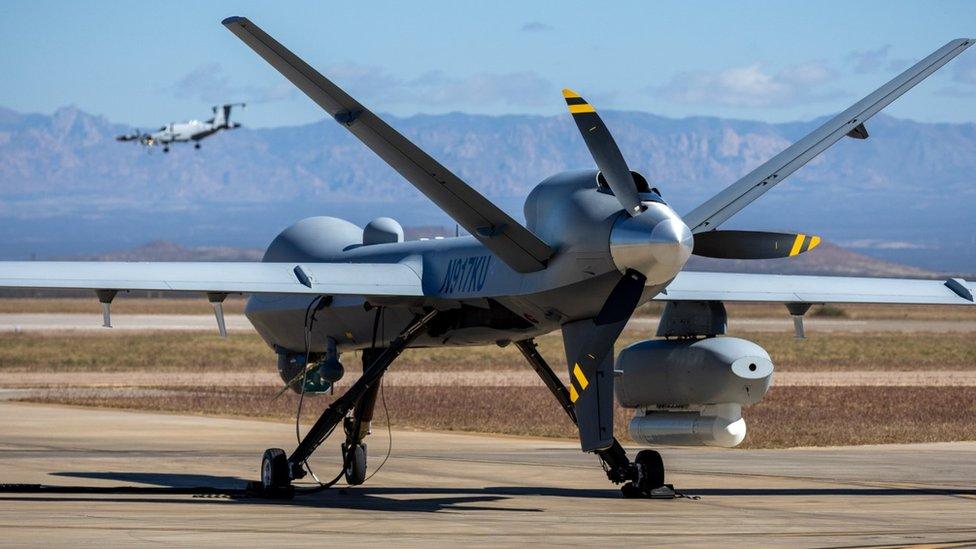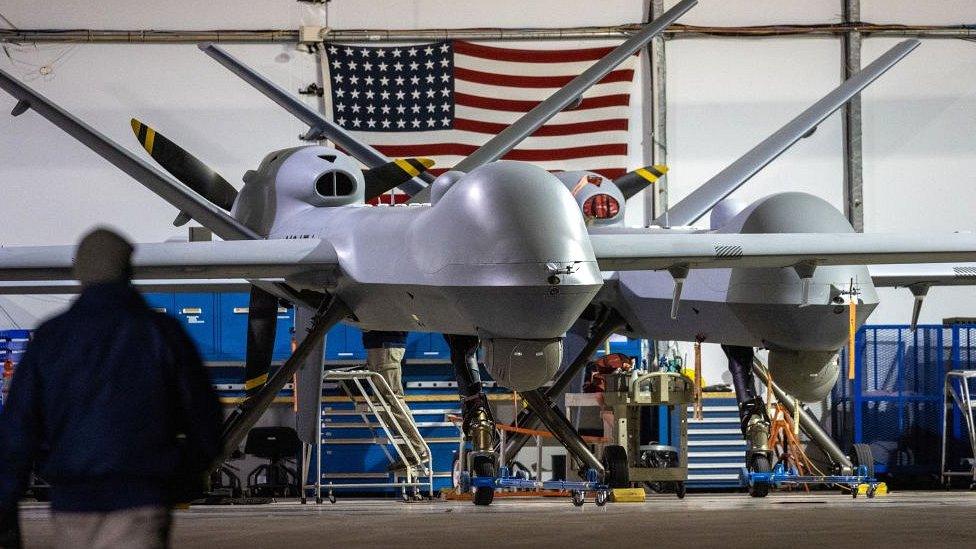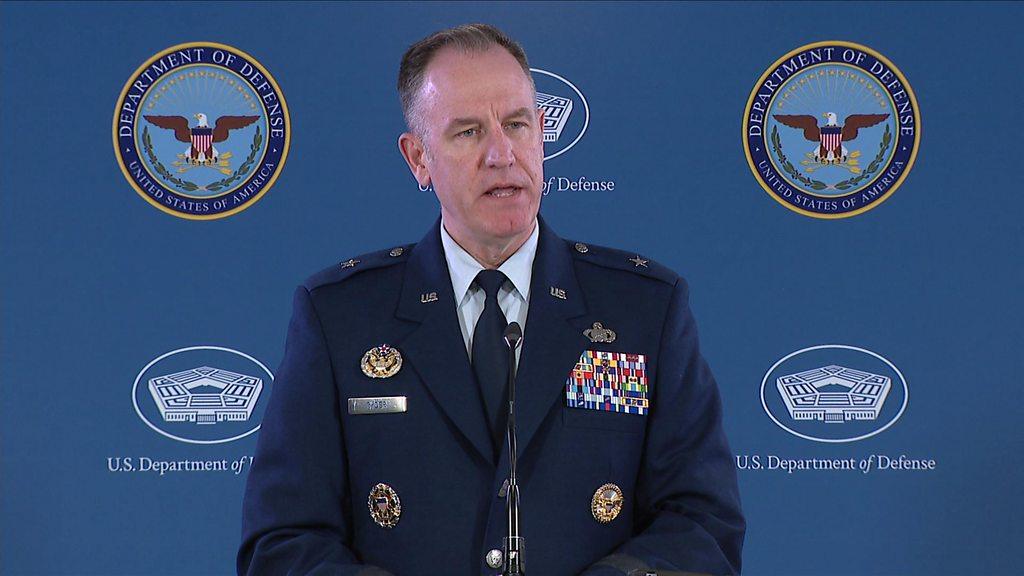US drone downing: Russia will try to retrieve remnants of drone
- Published
US drone crash inevitable, Ukraine minister tells BBC
Russia said on Wednesday that it would try to retrieve the remnants of a US drone that crashed into the Black Sea.
The large MQ-9 Reaper drone plunged into the water on Tuesday.
The US said it brought down the damaged drone after it became "unflyable" when a Russian jet clipped its propeller - but Moscow has denied these claims.
Speaking on state television, Russian security council secretary Nikolai Patrushev confirmed Moscow was attempting to find the aircraft.
"I don't know whether we'll be able to retrieve it or not but it has to be done," Mr Patrushev said.
He also said that the drone's presence in the Black Sea was "confirmation" that the US was directly involved in the war.
Senior Washington official John Kirby said the US was also searching for the aircraft, but stressed that if Russia beat them to it, "their ability to exploit useful intelligence will be highly minimised".
That message was reiterated by General Mark Milley, America's top military general, who said the US has taken "mitigating measures" to ensure there was nothing of value on the downed drone.
He said it would be challenging to retrieve the drone, noting the water where it crashed was anywhere between 4,000ft to 5,000ft (1,200m to 1,500m) deep.
US military officials said the incident happened on Tuesday morning and the confrontation lasted around 30-40 minutes.
In a statement, the US said Russian jets dumped fuel on the drone several times before the collision.
Pentagon spokesman Brig Gen Pat Ryder told reporters the drone was "unflyable and uncontrollable", adding the collision also likely damaged the Russian aircraft.
Russia has denied its two Su-27 fighter jets made any contact with the US drone.
Russia's defence ministry said the drone crashed after a "sharp manoeuvre", and that it was flying with its transponders (communication devices) turned off.
The US Defence Secretary, Lloyd Austin, confirmed he had spoken with his Russian counterpart, Sergei Shoigu, the day after the drone was downed.
In a statement released after the phonecall, Russia's defence ministry said Mr Shoigu blamed the incident on "increased reconnaissance activities against the interests of the Russian Federation". It also called US drone flights off the coast of Crimea "provocative".
The US and UK have previously gone to extraordinary lengths to recover their technology after crashes.
They retrieved the wreckage of their stealth fighter jet, the F-35 from the bottom of the South China Sea after it sank.
But on the face of it, the Pentagon seems more relaxed about losing a Reaper drone. It's older technology and numerous have been lost before.
And trying to recover a downed drone in deep waters, next to a war zone, with Russian ships and submarines patrolling, could present even greater risks of escalation.
Tensions have risen over the Black Sea ever since Russia's annexation of nearby Crimea in 2014.
And since Russia's full-scale invasion of Ukraine, the US and the UK have stepped up surveillance flights, though always operating in international airspace.
The lost Reaper may have been carrying a surveillance pod able to suck up electronic data such as radar emissions.
The US Department of Defense said in a press release, external that the surveillance trips are used to gather information which helps improve security for Europe and supports "allied partners".
The US has reportedly shared intelligence with Ukraine previously, including to help it sink a Russian ship in the Black Sea.

Reaper drones are surveillance aircraft with a 20m (66ft) wingspan
Ukraine's foreign minister told BBC reporter James Landale that incidents such as the downing of a US drone over the Black Sea are inevitable until Russia leaves Crimea.
Describing it as a "routine incident", Dmytro Kuleba said: "As long as Russia controls Crimea, these kinds of incidents will be inevitable and the Black Sea will not be a safe place."
Russia annexed Crimea in 2014, but the vast majority of countries still recognise it as part of Ukraine.
The BBC asked Mr Kuleba if, following the drone incident, the US and other allies might become more cautious.
"If the West wants to demonstrate its weakness, it should certainly demonstrate its cautiousness after an incident like this, but I don't have a feeling that this is the mood in capitals," he replied.
"The mood is not to escalate but nor is the mood to lean under the pressure - the physical or rhetorical pressure - of Russia."
US Defence Secretary Lloyd Austin vowed the military would "continue to fly and operate" wherever international law allows.
After being summoned to speak to officials in Washington, Russian ambassador Anatoly Antonov said Moscow saw the drone incident as "a provocation".
From the Kremlin's point of view Mr Antonov added: "The unacceptable activity of the US military in the close proximity to our borders is a cause for concern."
On Wednesday, Kremlin spokesman Dmitry Peskov reporters there has been no high-level contact between Moscow and Washington over the incident.
But he said Russia would never refuse to engage in constructive dialogue.


Related topics
- Published14 March 2023

- Published14 March 2023

- Published15 March 2023
